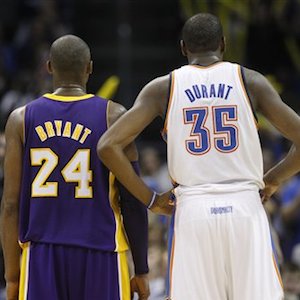Sign up for the daily CJR newsletter.
NBA superstar Kevin Durant was mocked last week for lamenting news coverage of Kobe Bryant, the Los Angeles Laker whose once-in-a-generation talents have deteriorated this year to nearly sub-pro standards. Except Durant’s criticism wasn’t a naive air ball. Rather, the 6-foot-9 forward made a reasonable case for contextualized reporting that went over many people’s heads.
Durant is among the most respected players in the league, partly for being thoughtful and soft-spoken, which is why his comments on Bryant’s retirement announcement were taken so seriously. Kobe, on the other hand, has had a polarizing career on and off the court. On November 29, he revealed his retirement plans in a poem, “Dear Basketball,” published by The Players’ Tribune, a website for first-person essays from athletes. The next day, reporters asked players around the NBA, including the Oklahoma City Thunder’s Durant, for their thoughts.
The 27-year-old Durant said that, like many who grew up in the 2000s, he “idolized” Bryant. “I’ve been disappointed this year because you guys treated him like shit,” Durant said. “He’s a legend, and all I hear is about how bad he’s playing, how bad he’s shooting, and it’s time for him to hang it up. You guys treated one of our legends like shit, and I didn’t really like it. So hopefully now you can start being nice to him now that he decided to retire after this year.”
Many jumped to an uncharitable reading of Durant’s statement: that he wants players to be coddled, good ones especially, and that underperforming players can’t endure honest criticism. He’s been ridiculed as overly sensitive, particularly for his “start being nice” plea. His naivete about journalism is understandable, one might surmise. He’s just an athlete. A sarcastic Matt Moore of cbssports.com, ranking the Lakers worst in the league, writes, “Kevin Durant says I’m not allowed to say anything negative about Kobe Bryant because of all the good things he did in his career.”
Durant’s connection to The Players’ Tribune would seem to bear this out. The site is where professional athletes go to have their say—without the troublesome involvement of reporters. Derek Jeter created it last year amid his own sideshow final season on the New York Yankees, and Bryant, Durant, and many other players have contributed writing and made investments.
The site’s editorial director, Gary Hoenig, explains that The Players’ Tribune lets athletes “not constantly be victim to the scrum around them when they come out of an adrenalized experience, when they’re half-naked surrounded by 500 people,” according to a recent Wall Street Journal piece. It’s a direct-to-fan outlet that could marginalize news media, the Journal suggests.
But Durant’s call for more sensitive coverage of Bryant doesn’t necessarily mean he thinks The Players’ Tribune is the only place to find it. Could Durant expect that Kobe’s stats this year go unreported, that his shooting percentage be omitted from game stories? No. He must have been reacting to tone, which is certainly a realm for nuance.
Kobe’s ferocious competitiveness has helped him win five championships and alienate much of the basketball community. In the last week or so, after 20 seasons, he came to terms with the fact that his body can no longer respond to his will. That’s a humbling concession.
Coverage that seems to gleefully celebrate a divisive star’s undoing is likely to offend Durant and others, who are right to suggest that some players deserve preferential treatment. Veteran players should be spared mocking when their bodies falter. Legends should be treated respectfully when their talents fade away. Writers aren’t fans, but they are deeply engaged with sentiment and storyline.
Media are inclined to promote sustained interest in a topic. How badly did Kobe do tonight? requires daily attention. Kobe continues into his twilight, less so. “It seems like everybody is happy that he’s going out like this,” Durant told espn.com, elaborating on his initial statement. “Every game he’s played on TV is about how terrible he looks, every article the next day is about how he should retire and give it up.”
If writers challenge Bryant’s legacy, arguing that he’s an ego-driven ball hog, or that he’s milking his playing days for profit, so be it. Durant is at least entitled to disagree. A legend, after all, is just a long story. The final chapter should be reported just as thoughtfully as the first.
Has America ever needed a media defender more than now? Help us by joining CJR today.







